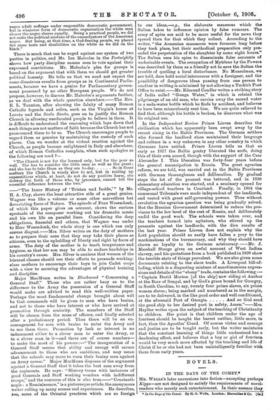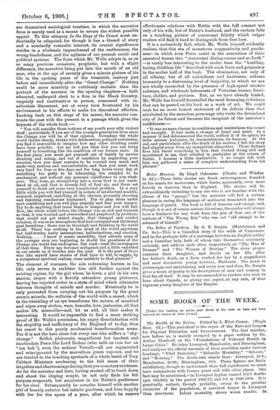NOVELS.
IN THE DAYS OF THE COMET.*
Mn. WELLS'S later excursions into fiction—excepting perhaps Hipps—are not designed to satisfy the requirements of novel. readers who merely seek entertainment. In their essence they • Its the Daus of the Comet. By H,. G. wens. London: Macmillan& CO. Lego
are dramatised sociological treatises, in which the narrative form is merely used as a means to secure the widest possible
appeal To this category In the Days of the Comet must un- doubtedly be relegated, for though it has a thread of story and a nominally romantic interest, its crucial significance
resides in a wholesale impeachment of the restlessness, the wrong-headedness, and the ugliness of our present social and political systems. The form which Mr. Wells adopts is, as on so many previous occasions, prophetic, but with a slight difference, the narrative being put into the mouth of an old man, who at the age of seventy gives a minute picture of his life in the opening years of the twentieth century just before and immediately after the "Great Change." Nothing could be more minutely or ruthlessly realistic than the portrait of the narrator in the opening chapters—a half- educated, underpaid clerk to a firm in the Black Country, ungainly and unattractive in person, consumed with in- articulate discontent, yet at every turn frustrated by his environment in his efforts to make his discontent effective. Looking back on this stage of his career, the narrator con- trasts the past with the present in a passage which gives the keynote of the whole book :—
" You will consider those notions of my youth poor silly violent staff; particularly if you are of the younger generation born since
the Change you will be of that opinion. Nowadays the whole world thinks clearly, thinks with deliberation, pellucid certainties, you find it impossible to imagine how any other thinking could
have been possible. Let me tell you then how you can bring yourself to something like the condition of our former state. In the first place, you must get yourself out of health by unwise drinking and eating, and out of condition by neglecting your exercise, then you must contrive to be worried very ranch and made very anxious and uncomfortable, and then you must work very bard for four or five days and for long hours every day at something too petty to be interesting, too complex to be mechanical, and without any personal significance to you what- ever. This done, go straightway into a room that is not venti- lated at all, and that is already full of foul air, and there set yourself to think out some very complicated problem. In a very little while you will find yourself in a state of intellectual muddle, annoyed, impatient, snatching at the obvious, presently choosing and rejecting conclusions haphazard. Try to play chess under such conditions and you will play stupidly and lose your temper. Try to do anything that taxes brain or temper and you will fail. Now, the whole world before the Change was as sick and feverish as that, it was worried and overworked and perplexed by problems that would not get stated simply, that changed and evaded solution, it was in an atmosphere that had corrupted and thickened past breathing ; there was no thorough cool thinking in the world at all. There was nothing in the mind of the world anywhere but half-truths, hasty assumptions, hallucinations, and emotion. Nothing. . . . I know it seems incredible, that already some of the younger men are beginning to doubt the greatness of the Change our world has undergone, but read—read the newspapers of that time. Every age becomes mitigated and a little ennobled in our minds as it recedes into the past. It is the part of those who like myself have stories of that time to tell, to supply, by a scrupulous spiritual realism, some antidote to that glamour."
The element of romance, the sole redeeming feature in his life, only serves to embitter him still further against the existing regime, for the girl whom he loves, a girl in his own station, elopes with a floridly attractive young plutocrat, leaving her rejected suitor in a state of mind which alternates between thoughts of suicide and murder. Eventually he is only prevented from carrying out his purpose by the great cosmic miracle, the collision of the world with a comet, which in the twinkling of an eye transforms the nature of mankind and wipes away strikes, wars, tumults, love, jealousies, all that makes life miserable—and, let us add, all that makes it interesting. It would be impossible to find a more striking proof of Mr. Wells's pessimism, his angry dissatisfaction with the stupidity and inefficiency of the England of to-day, than his resort to this purely mechanical transformation scene. For it is not the hero alone but every one who suffers a " sky- change." Selfish plutocrats, magnificent but insolent and inarticulate Peers like Lord Redcar (who calls an iron bar an "ion bah "), even the seducer Verrall—all are regenerated and reinvigorated by the marvellous green vapours, and we
are treated to the touching spectacle of a whole batch of Tory Cabinet Ministers awakening to the full sense of their iniquities and shortcomings during their pre-cometary existence. As for the narrator and hero, having started off to track down and sehoot the eloping couple, be not only finds his fell purpose evaporate, but acquiesces in his Nettle's preference for his rival. SUbsequently he consoles himself with another girl of homely exterior but infinite goodness, and lives happily with her for the space of a year, after which he renews
affectionate relations with Nettie with the full consent not only of his wife, but of Nettie's husband, and the curtain falls on a touching picture of communal felicity which vulgar readers will find it hard to distinguish from free love.
It is a melancholy fact, which Mr. Wells himself evidently realises, that this era of monstrous magnanimity and gentle- ness—in which even Peers assist in the conversion of their ancestral homes into "communal dining-rooms and so forth" —is vastly less interesting to the reader than the "hustling, hating, faithless life" described with such force and poignancy in the earlier half of the book. The elimination, not only of all villainy, but of all unkindness and harshness, reduces humanity to a distressing level of insipidity, to which we are not wholly reconciled by the presence of high-speed electric railways, and wholesale holocausts of Victorian houses, furni- ture, clothes, and pictures. But, as we have already hinted, Mr. Wells has himself forestalled the most damaging criticisms
that can be passed on his book as a work of art. We could wish for no more honest statement of its defects than that attributed to the nameless personage who visits the dreamland
city of ;he future and becomes the recipient of the narrator's confidences :—
" It was no mere change in conditions and institutions the comet had wrought. It had made a change of heart and mind. In a manner it had dehumanized the world, robbed it of its spites, its little intense jealousies, its inconsistencies, its humour. At the end, and particularly after the death of his mother, I felt his story had slipped away from my sympathies altogether. Those Beltane fires had burnt something in him that worked living still and unsubdued in me, that rebelled in particular at the return of Nettie. I became a little inattentive. I no longer felt with him, nor gathered a sense of complete understanding from his phrases."































































 Previous page
Previous page